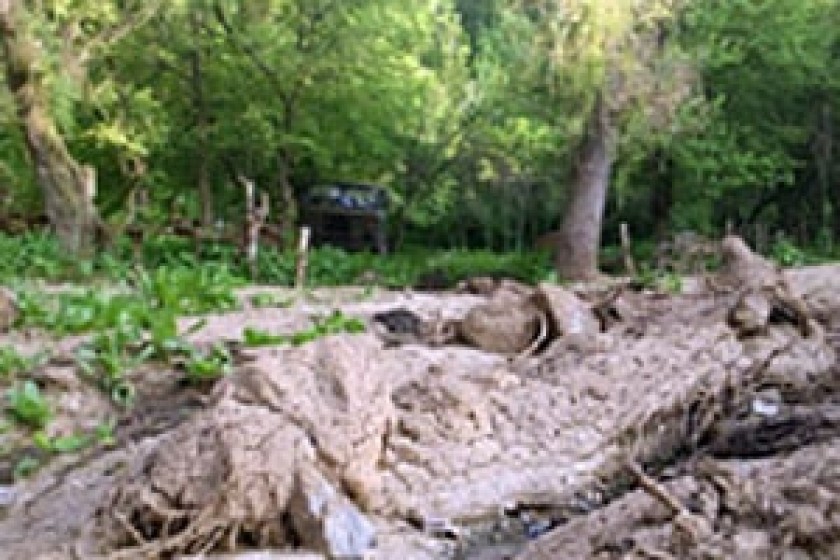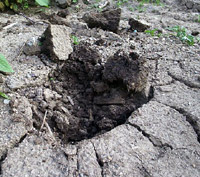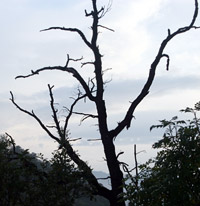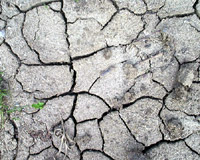
The Forest is Receding
Precious plants are nearing extinction in the forest area surrounding Vanadzor.
Agricultural scientist Lilia Bayramyan has identified such medicinal herbs and wild plants as nettle, thyme, mint, cat thyme, motherwort, Solomon's s eal,St. John'swort, etc. Her observation in and around Vanadzor's central bazaar last spring reveal that about four metric tons of herbs and wild plants were collected and sold each day during that period.
“If this trend continues the reserves of precious plants will be exhausted in two years,” Lilia Bayramyan concludes. Biologist Karen Afrikyan in his turn notes that in the near future one sort of both thyme andSt John'swort will end up in the Red Book.
Bayramyan explains that the ruthless collection of herbs is not the only human activity that threatens these precious plants. Her studies also suggest that the plants are endangered above all by logging in the area. “Since logging began, the temperature has risen. The precious plants began withering in the sunlight. Now they can only grow in the upper or trans-alpine layer of the forest. And people, in their turn, keep picking them.”
 The result of all this is that in the formerly forested areas of Vanadzor, precious plants are being replaced by herbaceous plants. Lilia Bayramyan has also discovered that as a consequence of the destruction of forest areas, fewer minerals are enriching the soil and nourishing the precious plants. “The quantity of phosphorus, nitrogen and potassium has decreased as a result of soil drenching,” she said. In return, favorable conditions for grass have been created. Wild horse-radish, trefoil, and coltsfoot have overtaken the former forests and, growing rapidly, prevent any other tree or plant seeds that end up here from taking root.
The result of all this is that in the formerly forested areas of Vanadzor, precious plants are being replaced by herbaceous plants. Lilia Bayramyan has also discovered that as a consequence of the destruction of forest areas, fewer minerals are enriching the soil and nourishing the precious plants. “The quantity of phosphorus, nitrogen and potassium has decreased as a result of soil drenching,” she said. In return, favorable conditions for grass have been created. Wild horse-radish, trefoil, and coltsfoot have overtaken the former forests and, growing rapidly, prevent any other tree or plant seeds that end up here from taking root.
“The fact is the forest is slowly receding,” Karen Afrikyan said. This means that a tree seed that falls on the soil will encounter the so-called dead layer composed of weeds and forest remains. This layer, as the phytosociologist explains, prevents the plant from reaching the main organic layer and, therefore, from finding nourishment.
“In many places where the dead layer is thin the seeds will bloom but the shadow of the weeds will deprive the sapling of sunlight and it will wither,” Afrikyan said.
The rapid propagation of herbaceous plants turns formerly forested areas into a zone of desert growth. Lilia Bayramyan maintains that a zonal alteration is now taking place, which entails climate change. In other words, the herbaceous plants are gradually turning the forest areas into a trans-alpine zone in which the temperature is continuously rising.
“In this case the trans-alpine vegetation that thrives in lower temperatures will suffer. The soil will be warm, as will the air, and the seeds will not grow. Grass will fill the area and the plain grasses will turn into desert vegetation. Insects will come in from hotter places. The harmful bloody nosed beetles will harm not only what forests still exist but the grass as well,” Bayramyan warned.
 “There will be desert vegetation; absinthium, camel's-thorn and other arid plants will grow and it will become impossible to restore the forest and the area will turn into a bald, dead zone. Not only the flora but the fauna will change” Karen Afrikyan predicted.
“There will be desert vegetation; absinthium, camel's-thorn and other arid plants will grow and it will become impossible to restore the forest and the area will turn into a bald, dead zone. Not only the flora but the fauna will change” Karen Afrikyan predicted.
As a result of the steady rise in temperature the forest will disappear. And in the Lori Marz, according to Karen Afrikyan, all the prerequisites now exist.
Experts add to these factors the drying-out of 500 springs in Lori and the decrease in black earth zones and point to desertification phenomena.
According to geologist Artak Demirchyan from the Lori Marz administration, 20% of the springs that have dried up over the last six years are in Vanadzor. If there is no forest, there is no humidity, no black earth. Landslides that result from logging are contributing to soil erosion.
Ashot Vardevanyan from the department of bio-resources management of the Ministry of Nature Protection believes the Lori Marz is in better shape from the point of view of desertification than the southern and central regions ofArmenia. At the same time he pointed out that this evaluation is approximate. “We have a problem with monitoring,” – he said, saying that it is necessary to study the concentration of humus and heavy metals in the soil in the Lori Marz as well as the species composition of forests.
 Following his own study of climate change and desertification inArmenia, geographer Ashot Khoyetsyan points to logging and other factors in desertification.
Following his own study of climate change and desertification inArmenia, geographer Ashot Khoyetsyan points to logging and other factors in desertification.
The National Action Plan to Combat Desertification inArmeniadeveloped under the guidance of Ashot Vardevanyan envisages only one action to combat desertification in Lori— the neutralization of the harmful impact of the Shamlor reservoir.
Four years have passed since the action plan was adopted but nothing has been done because of the lack of funds. Instead various projects aimed at forest restoration have been implemented without any expert supervision.
According Volodya Buniatyan, who heads the Lori Marz Department of Ecology and Agriculture, saplings have taken root on only 300 of the 1,500 hectares of land on which they were planted. Buniatyan favorably assesses the planting carried out over the last three years, though he says that only 40 % of the trees planted in Stepanavan, Lalvar, and Dilijan between 2003 and 2005 have taken root.
Karen Afrikyan points to areas in Lori that have been irrevocably lost and will not even be restored as forest zones in centuries. Among them he singles out the forests of Gugark and Vanadzor. At the same time, there has been a fundamental change in the composition of the Vanadzor forests, which prior to logging were 90% oaks and beeches.
“The natural forest has transformed into a secondary forest,” agreed Lilia Bayramyan. She believes it may take up to a thousand years to restore the natural forest, that is, if the area does not completely succumb to desertification, as it threatens to today.
 Videos
Videos Photos
Photos
Write a comment